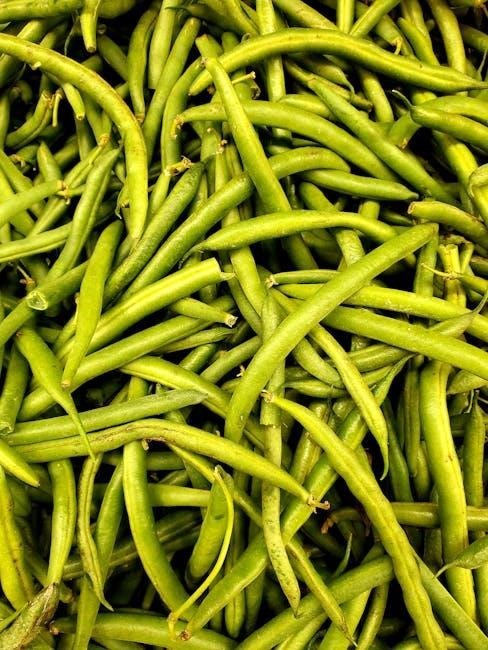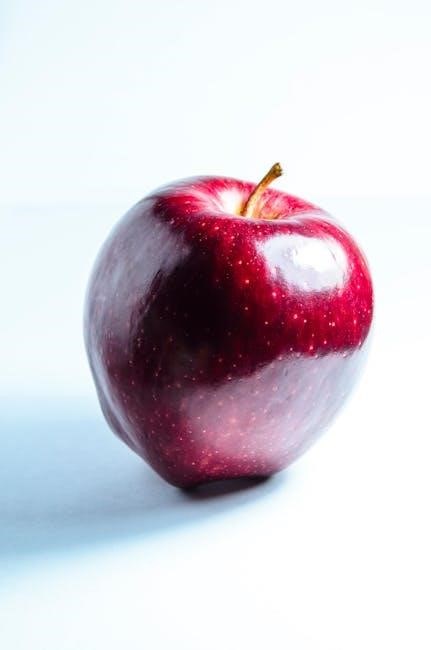
Plant-based foods are versatile, nutritious, and sustainable options, focusing on fruits, vegetables, legumes, whole grains, nuts, seeds, and fermented products. They offer numerous health benefits and environmental advantages.
With a variety of flavors and textures, plant-based diets are gaining popularity worldwide, supported by resources like PDF guides for meal planning and grocery lists for easy adoption.
Definition and Benefits of Plant-Based Diets
A plant-based diet emphasizes whole, minimally processed foods derived from plants, such as fruits, vegetables, legumes, whole grains, nuts, and seeds. It minimizes or excludes animal products, promoting health and sustainability. This dietary approach is associated with reduced risks of chronic diseases like heart disease, diabetes, and certain cancers, as it is rich in fiber, vitamins, and antioxidants. Plant-based diets are also linked to weight management and improved gut health due to their high nutrient density and low calorie content. Additionally, they support environmental health by reducing greenhouse gas emissions and conserving water and land. Overall, plant-based diets offer a balanced and sustainable way to nourish the body while benefiting the planet.
Importance of Whole, Unprocessed Plant Foods
Whole, unprocessed plant foods are foundational to a healthy diet, providing essential nutrients, fiber, and antioxidants. They include fruits, vegetables, legumes, whole grains, nuts, and seeds in their natural forms. Unlike processed foods, these retain their nutritional integrity, offering benefits like improved digestion, satiety, and blood sugar control. Diets rich in whole plant foods are associated with lower risks of chronic diseases, such as heart disease, diabetes, and obesity. They also support gut health by promoting a diverse microbiome. Incorporating these foods ensures a balanced intake of vitamins, minerals, and phytochemicals, which are vital for overall well-being. Prioritizing whole, unprocessed options helps maintain energy levels and supports long-term health goals, making them a cornerstone of a plant-based lifestyle.

Categories of Plant-Based Foods

Categories of Plant-Based Foods
Plant-based foods are categorized into fruits, vegetables, beans, legumes, whole grains, nuts, seeds, and fermented products, each offering unique nutritional benefits and culinary versatility.
Fruits
Fruits are a vibrant and essential part of plant-based diets, offering natural sweetness, vitamins, and antioxidants. They include berries like strawberries, blueberries, and raspberries, as well as tropical options like mangoes, bananas, and papayas. Citrus fruits such as oranges, lemons, and grapefruits are rich in vitamin C, while apples, pears, and grapes provide fiber and antioxidants. Exotic fruits like pineapples, kiwis, and pomegranates add variety and nutritional diversity. Fruits are versatile, enjoyed fresh, in smoothies, or as desserts, making them a delightful and healthy addition to any meal. They also support immune function, energy levels, and overall well-being, making them a cornerstone of plant-based eating.
Vegetables
Vegetables are a cornerstone of plant-based diets, offering a wide variety of textures, flavors, and nutrients. Leafy greens like spinach, kale, and broccoli are rich in vitamins and minerals, while cruciferous vegetables such as cauliflower and Brussels sprouts provide cancer-fighting compounds. Root vegetables like carrots, beets, and sweet potatoes are excellent sources of fiber and antioxidants. Colorful vegetables, including bell peppers, zucchini, and tomatoes, add vibrancy and nutrients to meals. Vegetables are versatile, enjoyed raw in salads, roasted as side dishes, or added to soups and stir-fries. They support immune function, digestive health, and overall well-being, making them an essential component of a balanced plant-based diet. Incorporating a diverse range of vegetables ensures a broad intake of essential nutrients for optimal health.

Beans and Legumes
Beans and legumes are protein-rich, plant-based staples, offering exceptional nutritional value. They include black beans, lentils, chickpeas, kidney beans, and edamame, providing essential amino acids and fiber. These foods are versatile, used in soups, stews, salads, and as substitutes for meat in dishes like veggie burgers and chili. Legumes are also rich in iron, zinc, and B vitamins, supporting energy levels and immune function. They are economical, sustainable, and accessible, making them a fundamental component of plant-based diets worldwide. Regular consumption of beans and legumes can improve heart health and aid in weight management, while their plant-based origin supports environmental sustainability. Incorporating a variety of beans and legumes ensures a balanced intake of nutrients and flavors in meals.
Whole Grains
Whole grains are a cornerstone of plant-based diets, offering a wealth of nutrients, fiber, and energy. They include options like brown rice, quinoa, oats, barley, and rye, each providing essential vitamins, minerals, and antioxidants. Whole grains are rich in complex carbohydrates, which support sustained energy levels and overall health. They also contain phytochemicals that can help reduce inflammation and improve heart health. Incorporating whole grains into meals is simple, with choices like whole wheat bread, pasta, and cereals. Additionally, sprouted grains, such as sprouted brown rice or quinoa, offer enhanced nutrient availability. Whole grains are versatile and can be used in salads, stir-fries, or as a base for plant-based dishes. They are a key component of a balanced and nutritious plant-based diet, promoting better digestion and long-term wellness.
Nuts and Seeds
Nuts and seeds are nutrient-dense plant-based foods, offering healthy fats, proteins, and essential micronutrients. Popular choices include almonds, walnuts, chia seeds, flaxseeds, and sunflower seeds. These foods are rich in vitamins and minerals like magnesium, zinc, and vitamin E, supporting immune function and heart health. Nuts and seeds also provide fiber, aiding digestion and promoting satiety. They are versatile additions to meals, whether sprinkled on salads, blended into smoothies, or enjoyed as snacks. For convenience, they are widely available in stores and can be easily incorporated into a variety of dishes. Nuts and seeds are also excellent sources of plant-based omega-3 fatty acids, particularly flaxseeds and chia seeds, making them a great option for those avoiding animal products. Including them in your diet can enhance both nutrition and flavor, supporting an overall balanced lifestyle.
Popular Plant-Based Food Options
Plant-based foods are increasingly popular due to their versatility and nutritional benefits. They include fruits, vegetables, beans, legumes, whole grains, nuts, seeds, and fermented products.
Options like vegan burgers, lentil curries, and chickpea salads are trending. These foods offer rich flavors, textures, and nutrients, making them ideal for diverse culinary creations and dietary needs.
Iron-Rich Plant-Based Foods
Plant-based diets offer a variety of iron-rich foods, ensuring adequate intake without animal products. Iron is essential for healthy red blood cells and oxygen transport in the body.
- Lentils are a top source, with about 6.6 mg per cup, making them ideal for curries and stews.
- Chickpeas provide 4.7 mg per cup, perfect for hummus, salads, and stir-fries.
- Black beans offer 3;9 mg per cup, great for Latin-inspired dishes like tacos and rice bowls.
- Spinach contains 4.9 mg per cup, especially when cooked, and pairs well in smoothies or sautéed meals.
- Quinoa is a complete grain with 2.8 mg per cup, ideal for nutritious salads and side dishes.
Incorporating these foods into meals ensures a steady iron supply, supporting energy levels and overall health. Pairing iron-rich foods with Vitamin C sources enhances absorption for maximum benefit.
Vitamin C-Rich Plant-Based Foods
Vitamin C is vital for immune function, collagen production, and iron absorption, making it a crucial nutrient in plant-based diets. Citrus fruits like oranges, lemons, and grapefruits are excellent sources.
- Strawberries provide a sweet and tangy source of Vitamin C, perfect for snacking or adding to oatmeal.
- Kiwi is rich in Vitamin C, with one medium fruit offering over 70 mg, supporting skin health and immunity.
- Bell peppers, especially red and yellow varieties, are high in Vitamin C and add crunch to salads or stir-fries.
- Broccoli and Brussels sprouts are cruciferous vegetables packed with Vitamin C, ideal for steaming or roasting.
- Papaya and Pineapple are tropical fruits that not only boost Vitamin C intake but also add flavor to smoothies.
Incorporating these foods into daily meals ensures optimal Vitamin C levels, enhancing overall health and vitality.
Fermented and Sprouted Plant-Based Foods
Fermented and sprouted plant-based foods are nutrient-dense options that enhance digestion and bioavailability of nutrients. Fermentation preserves food naturally, creating probiotics that support gut health.
- Sauerkraut and kimchi are fermented vegetables rich in vitamins and minerals, adding tangy flavors to meals.
- Miso and tempeh are fermented soybean products, offering umami flavor and protein.
- Kefir (plant-based) and yogurt alternatives provide probiotics for a healthy microbiome.
- Sprouted grains and legumes, like mung beans and lentils, have higher nutrient availability due to the sprouting process.
- Broccoli sprouts are rich in sulforaphane, supporting detoxification and antioxidant defenses.
These foods are versatile and can be easily incorporated into meals, from salads to smoothies, boosting both nutrition and flavor.

Practical Resources for Plant-Based Diets
Downloadable PDF guides, meal planning templates, and searchable grocery lists simplify adopting plant-based eating, offering organized tools for a seamless transition to a healthier lifestyle.
Plant-Based Grocery List Templates
Plant-based grocery list templates are essential tools for organizing your shopping, ensuring you never miss key items. These templates typically categorize foods like fruits, vegetables, beans, whole grains, nuts, and seeds, making meal planning efficient. Many templates are available in PDF format for easy printing or digital use, allowing you to check off items as you shop. They often include space for adding personal favorites or dietary preferences, such as gluten-free or vegan options. Using a grocery list template helps reduce food waste, saves time, and ensures a balanced intake of nutrients. Popular templates also include tips for buying seasonal produce or bulk items, making your plant-based journey more sustainable and cost-effective. They are a practical starting point for anyone transitioning to a plant-based lifestyle.
PDF Guides for Meal Planning
PDF guides for meal planning are invaluable resources for those adopting a plant-based lifestyle. These guides often include detailed meal templates, grocery lists, and nutritional advice, ensuring a balanced diet. Many PDFs feature recipes for breakfast, lunch, and dinner, such as smoothie bowls, salads, and hearty stir-fries. They also provide tips for budget-friendly shopping and reducing food waste. Some guides focus on specific dietary needs, like gluten-free or high-protein plant-based meals. With clear layouts and printable formats, these PDFs make meal prep easier and more organized. They often include visual charts and step-by-step instructions, helping users stay on track with their plant-based goals. Whether you’re a beginner or an experienced plant-based eater, these guides offer inspiration and practical advice for delicious, nutritious meals.
Searchable Terms for Easy Reference
Searchable terms are essential for quickly identifying plant-based food options in PDF guides. Common terms include Vitamin C-rich foods, iron-rich plant-based options, and fermented foods. These terms help users locate specific nutrients or food categories efficiently. Many PDFs also include keywords like whole grains, legumes, nuts, and seeds, making it easier to plan balanced meals. Additionally, terms like meal prep ideas and budget-friendly recipes are often highlighted for practicality. By using these searchable terms, individuals can navigate PDF guides seamlessly, finding exactly what they need without wasted time. This feature is particularly useful for those new to plant-based diets, ensuring they can make informed choices and stay organized in their culinary journey.




